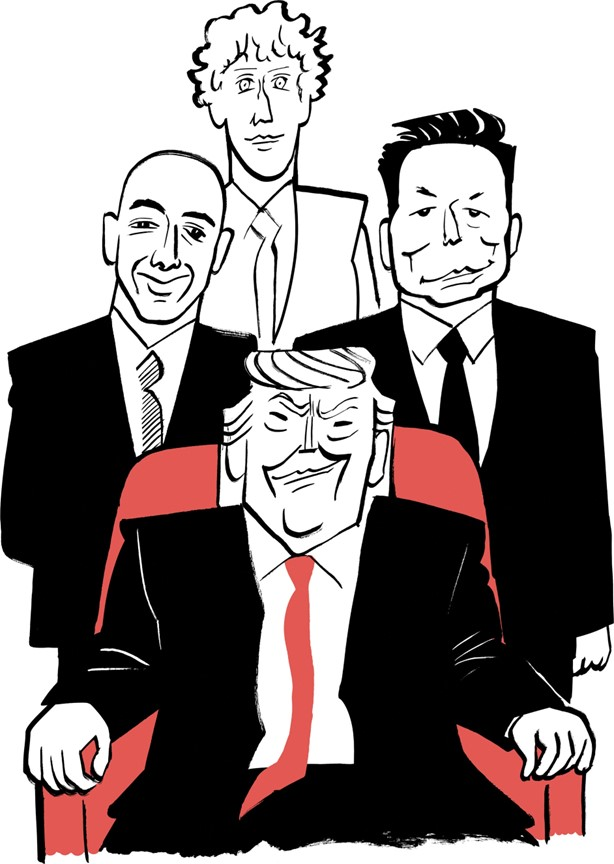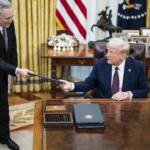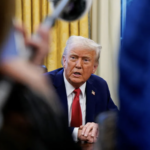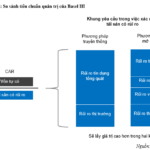When Anti-Elites Become the Elites
Despite Donald Trump’s election being fueled by a strong public backlash against the “elites,” his most prominent supporters are top politicians and tycoons. This was evident during his first term, when Trump—a wealthy and famous businessman—surrounded himself with a group of Republican politicians, Wall Street tycoons, and economic nationalists. But this time, these groups are supplemented by members of the tech right, most notably the world’s richest man, Elon Musk.

Source: The New Yorker
What links these groups, at least for now, is not Trump’s character or leadership abilities (both are highly contested). Instead, it is the belief that their individual goals will be more easily achieved under Trump compared to alternative options.
Conservative Republicans want low taxes and fewer regulations, while economic nationalists seek to reduce trade deficits and restore American manufacturing.
Free speech absolutists believe there should be an end to what they see as “woke censorship,” while the tech right longs for the freedom to realize their own visions of the future.
When Special Interests Trump Democratic Values
Regardless of their individual intentions, these groups view Kamala Harris (and Joe Biden) as an obstacle, while Trump is seen as a promising ally. Most do not object to democracy, but they seem willing to overlook and thereby enable Trump’s authoritarian tendencies as long as their objectives are met. If you highlight Trump’s anti-democratic tendencies and contempt for the rule of law, they will respond vaguely or downplay these risks.
During Trump’s first term, I shared my concerns with one of his top economic advisors (an economic nationalist). But my interlocutor brushed aside these worries and countered that the Democratic Party and the bureaucratic establishment posed greater threats. Ultimately, he was only concerned about Trump’s commitment to tariffs, not any potential consequences for democracy.
Similarly, in a recent podcast by New York Times journalist Ezra Klein, free speech absolutist Martin Gurri explained that his support for Trump was primarily driven by the Biden administration’s perceived clampdown on free speech. Gurri claims that Biden has “asked social media platforms to adhere to European community standards.” Yet, the restrictions imposed by Trump on the speech of public servants and private organizations funded by the government have been far more severe. Even as he acknowledges that Trump could be “even worse,” Gurri does not seem particularly bothered. When push comes to shove, countering “woke” culture seems to take precedence over defending the First Amendment.
(*) “Woke” has recently become a negative political term used to describe anything deemed too liberal or progressive. However, the term has a longer history, originally meaning being aware of racially motivated threats (According to Forbes)
Internal Conflict Between Economic Nationalists and the Tech Right
Trump’s elite supporters prioritize their group interests over democratic principles. However, internal conflicts are likely to surface and cause cracks in Trump’s coalition. The most notable conflict is between the economic nationalists and the tech right. Both sides see themselves as fighting against a system imposed by the Democratic Party’s elites. But they represent very different visions for America and its future direction.
Economic nationalists want to return to a glorious past when American industry shone brightly, while the tech right envisions a futuristic AI-managed utopia. One side wants to put the people first, while the other worships technology. One side wants to halt immigration entirely, while the other seeks to welcome skilled talent. One side wants to rein in Silicon Valley, while the other wants to empower it. One side believes in taxing the rich, while the other favors the wealthy.
The nationalist populists claim to speak for those left behind by Musk’s technological revolution. So, it’s no surprise they deeply disdain the “tech feudalists” of Silicon Valley. Steve Bannon, one of the most prominent voices among economic nationalists (and a Harvard graduate), goes so far as to call Musk an “illegal immigrant parasite.” Musk and what he represents must be “stopped,” warns Bannon. “If we don’t stop it now, it will not only destroy this country, it will destroy the world.”

Source: Project Syndicate
Although Bannon does not currently serve in the Trump administration, he is an important figure in the MAGA (“Make America Great Again”) movement and maintains close ties with many senior officials. However, it is clear that Musk is currently being listened to more by Trump. The White House has given Musk’s so-called Office of the DOGE (Department of Governing Efficiency) free rein, and Trump himself has encouraged Musk to be more assertive.
Trump’s Tactics and America’s Uncertain Future
Leaders like Trump often encourage their allies (or courtiers) to compete with each other to prevent any one group from gaining too much power. Trump believes he can maintain his position and exploit these conflicts for his own benefit. However, this strategy only works when the competition among groups revolves around resources and government favors, rather than differing ideologies and beliefs.
With the forces driving the Trump administration holding distinct and divergent policy views and priorities, a confrontation is almost inevitable. But what will happen afterward? Will there be paralysis, or will one group assert its dominance? Can the Democratic Party take advantage of this divide? Will Trumpism be discredited? Will the prospects for American democracy be revived or continue to decline?
Whatever the outcome, the tragedy is that the less educated working-class voters, who supported Trump’s anti-elite message, will still be the losers. None of the opposing groups in Trump’s coalition offer a convincing vision for them. This is also true for the economic nationalists (despite their rhetoric) as their wishes rely on an unrealistic revival of manufacturing.
As different elites fight for their versions of America, the urgent policy agenda needed to build a middle-class economy in a post-industrial society will remain elusive.
About the Author: Dani Rodrik
Dani Rodrik is a Turkish-American economist known for his work on globalization, economic growth, political economy, and development economics.
He received his bachelor’s degree in Political Economy from Harvard University in 1979 and then obtained a master’s degree in Public Administration from Princeton University in 1981. He went on to pursue a Ph.D. in Economics at Princeton University, which he completed in 1985.
Dani Rodrik is currently the Ford Foundation International Professor of Economics at Harvard University. He also serves as the president of the International Economic Association (IEA) from 2021-2023 and is the co-founder of the Economics for Inclusive Prosperity (EFIP) network. He previously advised the World Bank, the International Monetary Fund, and the World Trade Organization.

Source: PEAC
The article reflects the views of the author Dani Rodrik
– 09:00 16/03/2025
The Crypto Superpower: Trump’s Vision for America’s Digital Dominance
With his new set of policies, former President Donald Trump was making a bold bet on cryptocurrency. His vision was to establish the United States as a powerhouse in this arena, revolutionizing Washington’s approach to digital assets.
Trump’s Tough Talk Leaves EU in a Bind: “Buy More American Energy or Face Higher Tariffs”
Former US President Donald Trump has threatened to impose tariffs on the European Union if its member states do not increase their purchases of American oil and natural gas. In a characteristic display of his aggressive trade policy approach, Trump is demanding that the EU boost its imports of US energy resources or face economic consequences. This bold ultimatum underscores Trump’s unwavering commitment to protecting and promoting American economic interests on the global stage.
Trump’s Second Term: Global Financial Fallout
Donald Trump’s second term brought about significant changes to the financial system, particularly in its approach to Basel III – the global standard for bank risk management. The delay and adjustment of Basel III implementation in the US not only impacted the domestic financial system but also had far-reaching effects on international markets, including Vietnam.





















